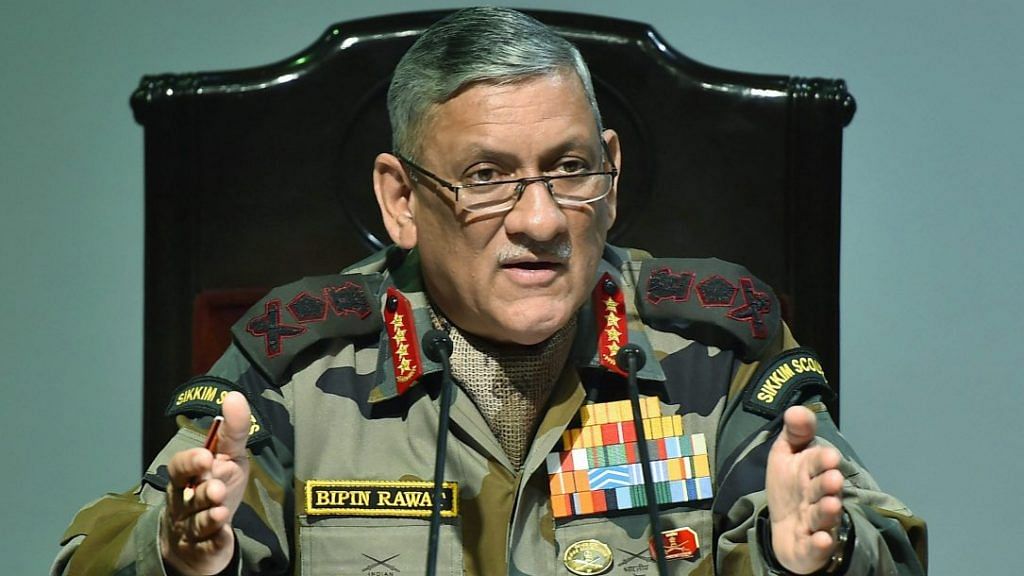The directives also address social behaviour, promotions, corruption, use of social media, financial and budgetary constraints, the size of the force.
New Delhi: A set of 23 directives issued by Army chief General Bipin Rawat, on issues ranging from liquor rations and social media use to promotions, has raised concern among serving officers as well as veterans.
The worries range from a possible cut in their liquor rations from the Canteen Stores Department (CSD) – with the chief referring to a need to prune expenses – to whether avenues for promotions will get choked in efforts to reorganise the force.
The chief’s directives even extend to the food to be served at ceremonial events – with pakoras, puris and sweets to be replaced by healthier snacks.
Successive Army chiefs, at least since the time of the late General Krishnaswamy Sundarji (1986-1988) have issued comparable commandments, but Rawat’s instructions have caught personnel on the wrong foot with more than one observation.
ThePrint was given a copy of the directives on the condition that they will not be quoted verbatim.
Push for transparency
The Army chief began his directives by saying that it was his priority to eliminate corruption in the awarding of contracts. The crackdown, he added, would be carried out without taking into account the suspects’ rank and/or stature.
He warned officers masking their work and seeking promotions by being sycophants. Such officers, he said, should be identified and those officers who put in genuine work should be rewarded.
Rawat also emphasised that the subsidised liquor and groceries sold through CSD should not be used for profiteering.
Noting that the facility was meant to allow officers, soldiers and their families easy access to essentials, he said he knew of instances where even small units had tried to rake in cash by exaggerating sales.
Each officer up to the rank of Brigadier (and equivalent in the Navy and the Indian Air Force) is entitled to purchase up to 10 bottles of liquor per month at subsidised CSD rates. Till 2010, the entitlement was 16 bottles per month per officer.
The consternation has been heightened by what one officer described as “a marked deterioration in the quantity and quality of essential supplies such as rice, flour and dal” because of confusion since the implementation of the goods and services tax (GST) last year.
In his push for transparency, the general also cited reports of personnel submitting fake medical bills from select hospitals to exploit the health scheme for serving and former servicemen. If verified, he warned, such instances, irrespective of the amount involved, could lead to the guilty person’s dismissal without pension.
Social media
The chief has said in his directives that social media should be used with discretion, adding that adversarial elements were attempting to plant rumours to weaken the Indian Army.
Rawat’s order comes just a month after a soldier from Kashmir was abducted and killed in the Valley, and his superior officer’s identity disclosed on social media. The officer and the soldier were deployed with one of the most active counter-insurgency units in the Kashmir Valley.
The soldier was on leave to go home, but violated standard operating procedures and took a detour to meet a woman he was in touch with on social media when he was picked up by his killers.
On Wednesday, a Hindi news website published the photograph of a special forces soldier involved in a counter-insurgency operation in Shopian Tuesday, with a profile identifying him. Two militants were killed in the operation.
Austerity push?
In the order, the chief also talked about discussions in the Army headquarters on ways to prune the force and reduce expenses for salaries and allowances. If this is implemented, he added, there would be more funds available for upgrading weapons and equipment.
He said the Defence Acquisitions Council (DAC) was meeting every two weeks to make purchases faster, adding that all items to be bought were categorised under three heads in order of priority. Items for purchase that are marked top priority will have to be bought before those in the subsequent two categories.
The Army chief also asked units and stations to observe all functions in a military fashion, without being ostentatious.
On health, parity
Pointing out that the Army was losing the equivalent of two battalions every year from among personnel not involved in operations, the chief stressed the importance of physical fitness. The Indian Army has 1.3 million personnel, with 800-900 soldiers in each infantry battalion.
In the same breath, he directed that pakodas, puris and sweets be substituted with healthier snacks at functions of the Army.
The chief also referred to the issue of rank and status parity with civilian equivalents in government, saying it was being examined at the very top. The matter has caused discontent in the forces since the ministry of defence, in 2016, issued an order equating some officers of the Armed Forces Headquarters Civil Service with military officers, who were till then a notch higher in rank.
‘Don’t lose heart’
The chief’s 23-point directions have been annotated in 14 points by the Military Secretary’s (MS) branch, which is, in effect, the human resources department of the Army and in charge of all postings and promotions.
According to the directives, a revision of rules and regulations was underway, indicating that the Army was taking a serious look at restructuring its cadre. The chief also sought to advise officers who have been superseded or not promoted to not take matters to heart, saying promotions had to be selective because of the military’s steep pyramidical hierarchy.
Even if good officers do not get selected to courses like the National Defence College (NDC), which would lead to promotions, the Army would make efforts to re-train or re-skill them for careers outside the military, he added.
